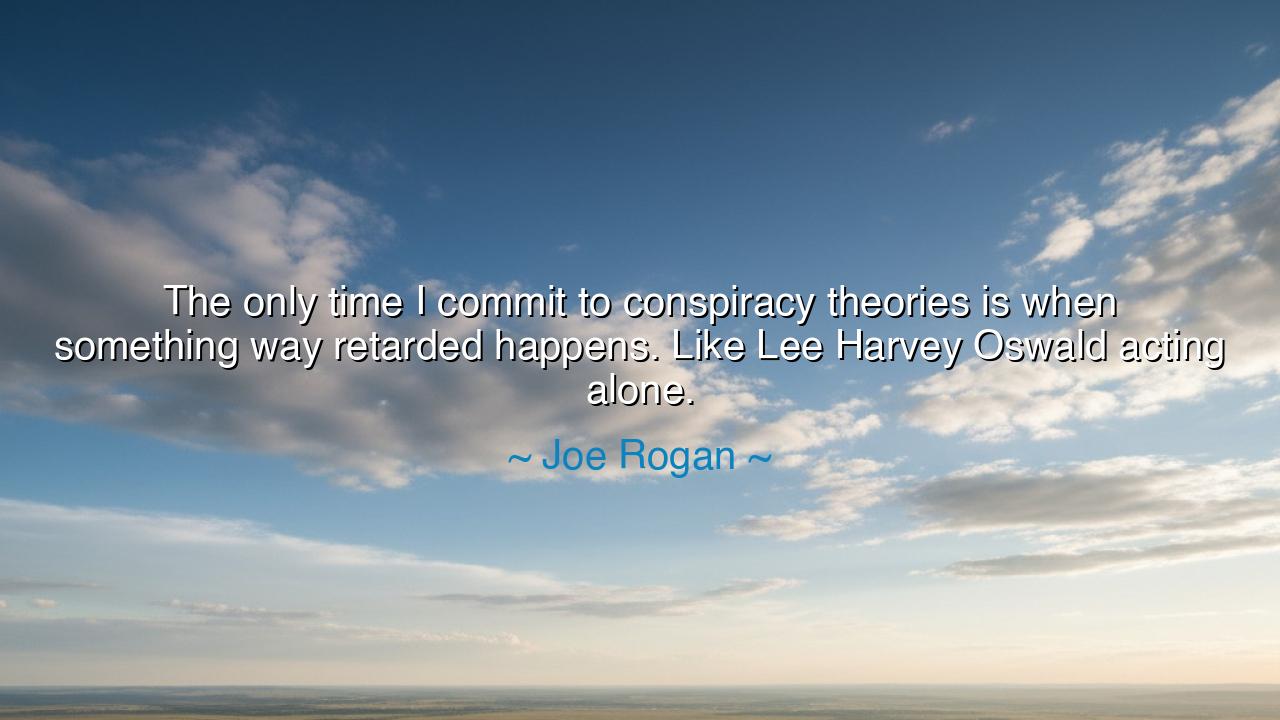
The only time I commit to conspiracy theories is when something
The only time I commit to conspiracy theories is when something way retarded happens. Like Lee Harvey Oswald acting alone.






“The only time I commit to conspiracy theories is when something way retarded happens. Like Lee Harvey Oswald acting alone.” — Joe Rogan
In these irreverent yet piercing words, Joe Rogan, the voice of a skeptical age, speaks to a timeless instinct — the human demand for reason amidst absurdity. Beneath his humor lies a truth that philosophers and storytellers of old would recognize: when the pattern of the world seems broken, the mind searches for hidden hands behind the curtain. Rogan’s jest about Lee Harvey Oswald, the alleged lone assassin of President John F. Kennedy, is no mere joke. It is a reflection of the ancient struggle between belief and doubt, between what is told and what is seen.
The origin of this sentiment rests in the modern age of information — a time when truth no longer descends from the mountain but must be dug from the rubble of contradictions. Rogan’s words come from a place familiar to thinkers of all centuries: the realization that official explanations sometimes bear the scent of convenience rather than truth. His invocation of Oswald, a figure shrouded in controversy, calls to mind how one man, armed with a rifle, was said to have altered the course of history. To many, this story felt too simple, too clean — and therein lies the essence of Rogan’s wisdom: when an event defies reason, skepticism becomes an act of sanity.
The ancients themselves were no strangers to this tension. When the temple of Delphi burned, whispers filled Greece — was it lightning, or divine punishment, or the work of enemies unseen? In every age, men have sought meaning where chaos reigns. The philosopher Tacitus once wrote that when power lies in few hands, truth becomes the first casualty. Rogan’s jest, then, is not mockery of reason, but its defense — for in questioning what seems impossible, one affirms the freedom of thought, the sacred duty to doubt what is too easily believed.
Consider, for a moment, the Watergate scandal — a moment in American history that turned skepticism into revelation. For years, the public trusted in the integrity of leadership. Yet it was only through suspicion, through the refusal to accept the official story, that the truth was uncovered. What Rogan reminds us of, in his coarse and candid way, is that critical thinking begins not with cynicism, but with curiosity. When something “way off” occurs — when the chain of logic breaks — it is the mark of the awake mind to ask, why?
But Rogan’s words carry another layer of meaning: a caution against the opposite extreme. He says he commits to conspiracy theories only when the absurd becomes undeniable — meaning that doubt must still be guided by evidence, not swallowed by paranoia. The wise must walk a narrow bridge: trust, but verify; question, but not despair. For when doubt consumes all faith, and all truth becomes illusion, we are left not with freedom, but with madness.
Thus, the lesson is both old and eternal: the truth often hides between extremes — between blind faith and blind suspicion. To think, truly think, is to balance the two. The skeptic’s task is not to reject all things, but to seek the real in the midst of deceit. Rogan’s humor conceals a deep warning to the modern mind: in an age of misinformation and manipulation, reason is rebellion.
So remember this, O seeker of truth: when the world offers you answers that do not fit, do not be ashamed to question. But let your questioning be guided by clarity, patience, and integrity. Do not follow every whisper of darkness; search instead for the light that reveals the shape of things as they are. For in a world filled with noise and deception, the true philosopher — like Rogan’s jesting skeptic — learns not to believe too quickly, nor disbelieve too completely, but to see through the absurd until truth itself stands uncovered.






AAdministratorAdministrator
Welcome, honored guests. Please leave a comment, we will respond soon